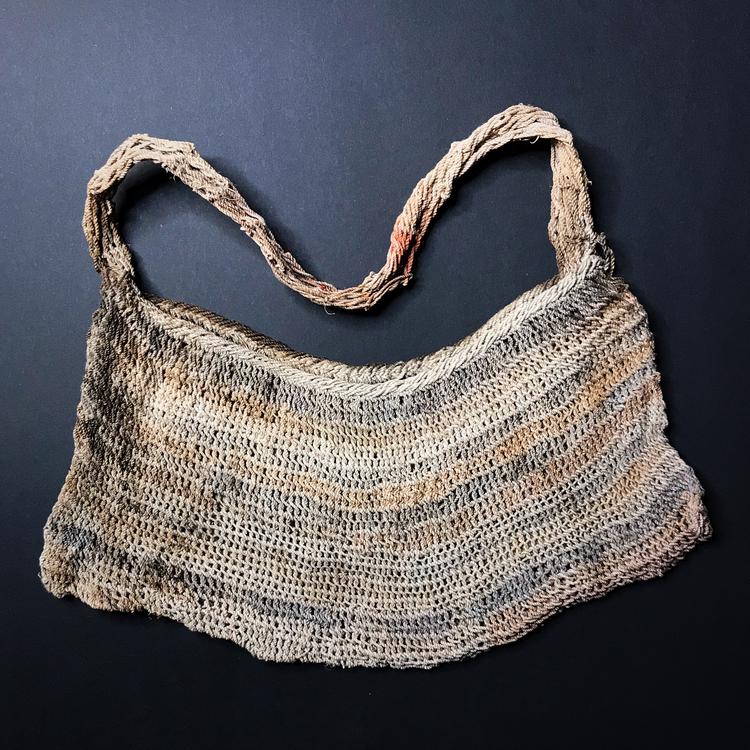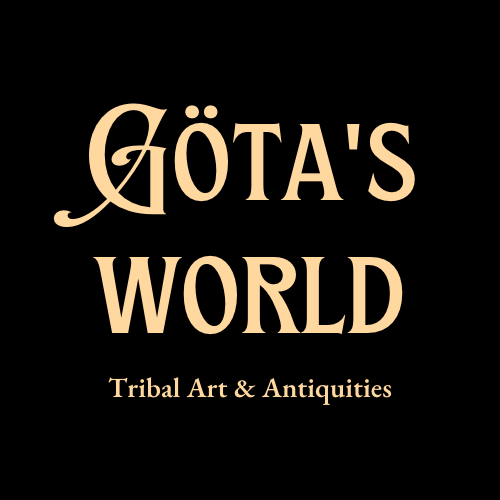Dani Tree Bark Fibre Net Bag (Noken)
Dani Tree Bark Fibre Net Bag (Noken)
Couldn't load pickup availability
Dani People, c. 1900–1950 AD, Baliem Valley, Irian Jaya, Papua, Indonesia
Absolutely beautiful, handwoven net bag (noken or bilum) crafted from natural tree bark fibre, featuring a loosely knotted structure with long strap and horizontal decorative bands in natural hues—the yellow likely derived from orchid fibre. Traditionally worn across the forehead, allowing the bag to hang against the wearer’s back, noken served multiple utilitarian purposes: carrying agricultural produce, firewood, river catch, or personal belongings.
The Dani inhabit the central highlands of Western New Guinea, in the fertile Baliem Valley of Papua. They are one of the most populous and culturally distinct groups in the region, related to the Yali, Moni, and Lani peoples. Traditional Dani villages comprise three main architectural forms: the Honai, Eweai, and Leseai. The Honai—round, thatched huts—serve as men’s sleeping quarters; the Eweai are reserved for women; and the Leseai, rectangular in shape, function as communal kitchen houses for cooking, gathering, and storytelling.
Prior to the arrival of outsiders in the late 1930s and the subsequent establishment of a Dutch colonial post in the 1950s, the Dani lived a self-sufficient agrarian and foraging lifestyle. Their belief system centered on animism, revering nature spirits and ancestral ghosts (mogat), who were believed to influence health, fortune, and fertility. The Dani concept of a life force, known as edai-egen (“seeds of singing”), was thought to dwell beneath the sternum—departing the body upon death to become a spirit requiring ritual appeasement.
Until the 1960s, before the introduction of metal tools, Dani craftsmanship relied on stone, bone, pig tusk, wood, and bamboo. Stone adzes and axes (kapak) were skillfully made, and gourds substituted for pottery vessels. Dani men traditionally wore only the penis sheath (koteka), while women donned grass or fibre skirts (sili or yokal). Ornamentation included cowry shell necklaces, feathered headdresses, and rattan armlets—objects of both beauty and social status.
The noken occupies a unique place in Dani culture as both a practical tool and a symbol of identity, resilience, and womanhood. Its creation involves meticulous technique: branches and bark from specific trees are cut, heated, soaked, and stripped to extract fine fibres, which are then dried, twisted, and knotted into strong, flexible cordage. These cords are handwoven—without the use of a loom—into intricate mesh structures, often taking weeks or months to complete.
An exquisite ethnographic artifact, this noken embodies the profound connection between Dani craftsmanship, environment, and spiritual life—a testament to one of the world’s most enduring tribal traditions.
Excellent condition. Age-related wear and signs of use. Lovely patina. Stains. Faded colors. Size approx. 27,5cm x 13,0cm.
Provenance: From a Dutch private collection; reportedly originally from the holdings of a now-closed ethnographic museum and foundation in the Netherlands.
For a similar example see:
Carrying Net, Pace, Stichting Papua Erfgoed, Accession Number: EA/59/42 (https://www.papuaerfgoed.org/en/EA/59/42)
References and further reading:
Encyclopedia of World Cultures, Oceania, Karl Heider, edited Terence Hays, G.K.Hall & Company, 1991.
Wealth Items in the Western Highlands of West Papua, Anton Ploeg, Ethnology, Vol.43. No.4 (Autumn 2004), pp. 291-313.
Papua blood: An account of West Papua, Peter Bang, BoD, 16 Apr 2018.
Dani tribe, Indonesia, Atlas of Humanity

-
Shipping
The shipment will be prepared in the course of 3-5 days and dispatched via Posti Group Oyj or purchased item(s) can be picked up from our shop during the store's opening hours (Tarkk’ampujankatu 4, 00140, Helsinki, Finland). Within the Finland, all items are shipped via Posti Group Oyj unless otherwise requested. We pack the items carefully and mainly in recycled materials because we want to save nature. You will receive the tracking number for your items by e-mail.
-
Returns
Returns and exchange will be accepted within fourteen days (14) of receipt at the purchaser’s cost to include freight and packaging. Items must be returned in the same condition as when they were shipped, and will not be accepted if damaged or altered in any way. Please inform us via email (info@gotanmaailma.fi) or by calling +358408408352 before sending. We do not accept returns more than 14 days after delivery.

